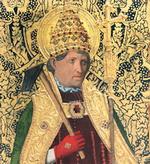'Blessed be the Lord!'
1. The splendid hymn of "blessing" that opens the Letter to the Ephesians and is proclaimed every Monday in the Liturgy of Vespers will be the subject of a series of extended meditations as we journey forward. For now, let us be content with a general look at this solemn, well-structured text as a whole, almost like an impressive building destined to exalt the marvellous work of God which is accomplished for us in Christ.
It starts with a "before" that precedes time and creation: this is divine eternity in which a plan is conceived that transcends us, a "predestination", or in other words, the loving and gratuitous design of a saving and glorious destiny.
God unites all things in Christ
2. In this transcendent plan that embraces the Creation and Redemption, the cosmos and human history, God "in his goodness" preordained that he would "unite all things in [Christ]", that is, that he would restore order and deep meaning to all things in heaven and on earth (cf. 1: 10). Of course, he is "head of the Church, which is his body" (1: 22-23), but he is also the vital principle of reference for the universe.
Thus, Christ's lordship extends to both the cosmos and that more specific horizon which is the Church. Christ's is a role of "fulfilment" so that the "mystery" (1: 9) hidden down the ages may be revealed in him, and all reality may actualize - in its specific order and at its own level - the plan conceived by the Father from eternity.
Salvation shows God's approval
3. As we will have an opportunity to see later, this kind of New Testament "psalm" focuses above all on the history of salvation that is the expression and living sign of "good will" (cf. 1: 9), "approval" (cf. 1: 6) and divine love.
Here, then, is the exaltation of the "redemption through his blood" on the Cross, the "forgiveness of our sins", the abundant outpouring of the "riches of his grace" (cf. 1: 7). This is the divine sonship of Christians (cf. 1: 5) and the "insight" into "the mystery of [God's] will" (1: 9) through which we enter into intimacy with the Trinitarian life itself.
With Christ, we lack nothing
4. Having taken a general look at the hymn that opens the Letter to the Ephesians, we will now listen to St John Chrysostom, an extraordinary teacher and orator, a fine Sacred Scripture exegete who lived in the fourth century and also became Bishop of Constantinople amid every kind of difficulty, and was even exiled twice.
In his First Homily on the Letter to the Ephesians, commenting on this Canticle, he reflects with gratitude on the "blessings" with which we have been blessed "in Christ": "Indeed, what do you lack? You have become immortal, you have become free persons, you have become sons, you have become righteous, you have become brothers, coheirs who reign with him and with him you are glorified. All this has been given to us and, as it is written, "...will he not also give us all things with him?' (Rom 8: 32). Your first fruit (cf. I Cor 15: 20, 23) is adored by angels, cherubim and seraphim: so what could you possibly lack?" (PG 62, 11).
God has done all this for us, St John Chrysostom continues, "according to the consent of his will". What does this mean? It means that God passionately desires and ardently longs for our salvation. "And why does he love us like this? Why does he feel such great affection for us? Out of goodness alone: in fact, "grace' is part of goodness" (ibid., 13).
For this very reason, the ancient Father of the Church concludes, St Paul says that everything was brought about for the "praise of his glorious grace which he freely bestowed on us in his Beloved Son". Indeed, "not only did God free us from sin, but he also made us lovable...: he adorned our soul and made it beautiful, desirable and lovable". And when Paul declares that God did so through the blood of his Son, St John Chrysostom exclaims: "Nothing is greater than all this: that for our sake God poured out his blood. Greater than our adoption as sons and his other gifts is the fact that God did not spare his own Son (cf. Rom 8: 32). It is indeed a great thing that sins have been forgiven: but even greater is what happened through the Blood of the Lord" (ibid., 14).
This item 5887 digitally provided courtesy of CatholicCulture.org






